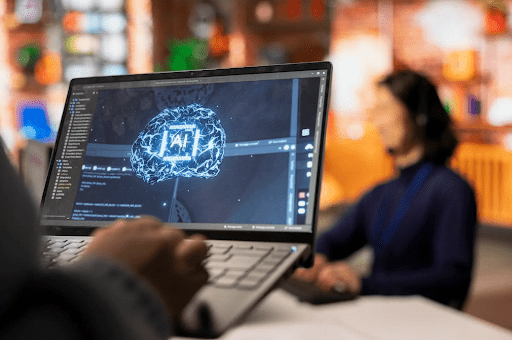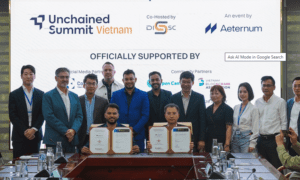Artificial intelligence is no longer a futuristic buzzword – it’s a reality transforming how digital agencies plan, design, and maintain websites. From AI-assisted code generation to automated SEO insights, these tools are changing how agencies operate and how clients experience the web.
For web agencies, this shift represents both opportunity and responsibility: the chance to streamline workflows, deliver measurable results faster, and stay ahead of competitors. This article explores five ways AI tools are reshaping website creation and optimization and what that means for forward-thinking digital teams.
1. Accelerated Development and Code Generation
AI-powered development tools are drastically reducing build times. Platforms highlighted by DigitalOcean show how intelligent coding assistants can interpret natural language prompts and instantly generate clean, functional code. Instead of manually writing every component, developers can focus on logic, scalability, and UX refinement.
For agencies, this means projects can move from concept to prototype in days rather than weeks. AI handles repetitive code tasks and detects potential bugs early, allowing teams to spend more time on strategy, testing, and performance optimization. When implemented correctly, AI-assisted coding becomes a collaborative partner – enhancing rather than replacing developer expertise.
The true advantage is consistency. AI tools can learn from previous builds, identify design patterns that work best across projects, and replicate that efficiency on demand. This kind of “institutional memory” allows agencies to scale without sacrificing quality. In the long term, AI-enabled code libraries will become a form of intellectual property for agencies – turning their workflows into proprietary systems that deliver predictable results with greater speed and precision.
2. Smarter UX and Personalization Through AI
User experience is now driven by adaptability. According to Uxify, AI-powered optimization uses behavioral data to adjust website layouts, navigation, and content in real time. Instead of static designs, pages evolve based on visitor intent and interaction patterns.
For example, AI can detect returning users and surface different calls-to-action or personalized product suggestions. Agencies that integrate these systems can help clients build experiences that feel intuitive and responsive to each user.
This shift also redefines design roles. UX designers increasingly collaborate with data scientists and AI specialists to translate behavioral patterns into design adjustments. The process becomes circular: design influences data collection, data influences user behavior, and AI bridges the two.
Imagine a healthcare website that detects when users hesitate on appointment forms. AI might automatically simplify the form layout, reorder fields, or provide reassurance messages about confidentiality – small adjustments that significantly increase conversions. These micro-optimizations used to require lengthy A/B testing cycles; now they happen instantly through predictive AI modeling.
For agencies, mastering this approach will become a differentiator. Clients expect not just attractive websites but measurable engagement improvements. Agencies that offer adaptive, data-driven UX will position themselves as true performance partners rather than simple design vendors.
3. Performance Optimization and Core Web Vitals
Performance remains one of the most critical ranking and conversion factors online. AI-driven platforms now analyze thousands of data points in real time to automatically improve load times, image compression, and server response rates. Tools like those discussed by Uxify use predictive prerendering – anticipating user navigation paths and preloading key elements to create near-instant experiences.
For agencies, this is transformative. AI doesn’t just automate optimization; it continuously learns which changes deliver the greatest impact. This ensures websites stay compliant with Google’s Core Web Vitals while enhancing overall user satisfaction. Instead of manual performance audits, AI handles the heavy lifting, giving developers actionable insights in minutes.
AI also helps balance competing priorities between performance and aesthetics. For instance, visual-heavy websites often struggle with page speed due to large media files. AI can automatically convert formats, adjust quality levels dynamically based on user connection speed, and prioritize above-the-fold content loading.
In the broader context, this trend also contributes to sustainability. Faster, lighter websites consume less energy and bandwidth – an increasingly important consideration as companies evaluate their digital carbon footprint. Agencies using AI to optimize not only deliver better performance metrics but also contribute to greener, more sustainable web infrastructure.
4. Automated SEO and Content Enhancement
Modern SEO is deeply intertwined with artificial intelligence. As DigitalOcean notes, many AI systems now generate SEO-friendly metadata, suggest internal links, and optimize content readability automatically. AI can analyze keyword intent, cluster semantic relationships, and even predict future search trends – allowing agencies to plan content strategies backed by real data.
However, automation doesn’t replace expertise. The most effective agencies combine AI’s analytical precision with human insight to ensure content remains authentic and aligned with brand voice. Experienced development partners like Mendel Sites integrate AI tools into SEO workflows to enhance optimization while maintaining editorial integrity. This hybrid approach allows for consistent improvements without sacrificing originality or strategy.
The next evolution in this space is generative engine optimization (GEO), a concept discussed in emerging research. As AI-driven search engines like ChatGPT and Perplexity shift the way users find information, agencies will need to optimize not only for keywords but for context and narrative relevance. AI-powered tools can already simulate conversational search queries to help predict how a brand’s content might perform in these new environments.
By embracing GEO principles early, agencies can future-proof their SEO efforts. Instead of reacting to algorithm changes, they can proactively align content strategies with how AI systems interpret expertise and relevance.
5. Streamlined Workflows and Scalable Agency Operations
Perhaps the most underappreciated impact of AI is how it enhances overall efficiency. Automated testing, debugging, and content management systems allow agencies to manage larger client portfolios without sacrificing quality. The DigitalOcean article emphasizes that AI tools can identify performance bottlenecks, generate testing reports, and standardize QA across multiple projects.
By reducing repetitive work, AI frees up creative teams to focus on higher-level problem-solving – concept development, brand identity, and conversion strategy. For growing agencies, this means scalable success: handling more complex projects, increasing client satisfaction, and boosting profitability through intelligent process automation.
Another critical advantage lies in predictive resource management. AI can forecast workloads based on historical project data, helping agencies balance team capacity and improve project delivery timelines. Tools integrated with project management software can even adjust task assignments automatically when deadlines shift or priorities change.
This level of foresight improves client communication too. Instead of estimating project completion through guesswork, agencies can provide data-backed projections, reducing uncertainty and improving trust. Over time, this operational transparency becomes part of the agency’s competitive advantage.
The workflow revolution doesn’t stop at production – AI also helps optimize business development. Predictive analytics can identify which leads are most likely to convert, analyze proposal win rates, and personalize pitches based on historical performance. The agencies that integrate AI into both creative and operational sides of their business will be the ones that scale sustainably.
Preparing Your Agency for the AI-Driven Future
The integration of AI into web design and development is no longer optional – it’s a strategic necessity. Agencies that adapt early gain a measurable competitive advantage: faster turnaround times, more consistent performance, and a data-driven understanding of user behavior. Those that resist will find it harder to compete as clients begin expecting intelligent automation by default.
The path forward isn’t about replacing creativity – it’s about empowering it. By using AI to eliminate technical barriers, designers and developers can focus on crafting authentic, impactful digital experiences. Agencies ready to modernize their workflow and embrace this shift can use AI to build future-ready websites that perform, adapt, and grow.
As adoption expands, agencies should also pay close attention to AI ethics and transparency. Clients and users deserve to know when AI influences design or content decisions. Clear disclosure, combined with responsible data use, ensures trust remains central to innovation. The most successful agencies of the next decade will not just use AI – they’ll use it responsibly, creatively, and transparently to serve both clients and audiences.
Frequently Asked Questions
How does AI improve web development speed?
AI automates repetitive coding tasks, generates boilerplate code, and identifies errors early – significantly reducing project turnaround times.
Will AI replace designers and developers?
No. AI assists professionals by handling low-level tasks, allowing teams to focus on creativity, strategy, and client relationships.
Is AI integration expensive for small agencies?
Many tools offer scalable plans or open-source options, making AI adoption accessible for agencies of all sizes.
Can AI-driven optimization harm SEO?
Not when implemented thoughtfully. AI enhances performance and keyword targeting but still requires human oversight to maintain quality.
What is the future of AI in digital agencies?
The future lies in hybrid creativity – agencies using AI to amplify human design, strategy, and storytelling rather than automate it entirely.



































